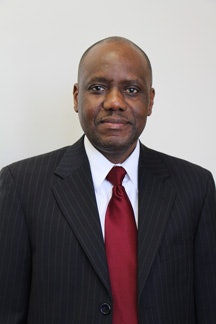Marshall Chimwedzi is helping increase Alabama A&M University’s status as an environmentally sustainable historically Black institution through his grant writing capacity and service as the university’s director of transportation.
In his tenure at the university, Chimwedzi has secured nearly $5.4 million in grants from the U.S. Department of Transportation’s Federal Transit Authority (FTA) for low-emission bus projects and technology upgrades. In addition, his office oversees several initiatives, including a student-led project called “Clean Low Emissions Approach & Novel Transportation Innovation Practice” (CLEAN-TRIP).
“Marshall is not only a leader at Alabama A&M, but within all of higher education transportation services,” said Clayton Gibson, senior vice president for finance and administration. “He works tirelessly to secure funding opportunities for transportation, while also ensuring that we reduce the impact that we have on the environment.”
Chimwedzi notes that his previous experience working with the Small Business Administration gave him exposure to grant writing, which has in turn, enabled him to transform the Bulldog Transit Service system, address noise pollution and support students and the campus community in becoming environmentally friendly.
 Marshall Chimwedzi
Marshall ChimwedziIn 2013, Chimwedzi’s grant proposal for AAMU was among the 133 out of 400 approved for an FTA grant totaling $620,000. The grant helped fund the renovation of an auto shop and a vehicle equipment wash bay at the institution, among other projects.
In Fiscal Year 2017, AAMU’s Department of Transportation received a $1 million grant from FTA through a “Low-No” program. Funding helped with the purchasing of electric buses, charging stations and related equipment. It also made AAMU the first higher education institution in Alabama to use electric transit buses, Chimwedzi said.
And for Fiscal Year 2018, Chimwedzi’s office secured a FTA grant totaling $3,761,033 to purchase more electric buses and upgrade technology, in addition to constructing a bus storage facility and installing bus shelters.
Significantly, Chimwedzi’s work is cross-functional with ties to the university’s strategic plan for 2015-2025. Transportation services are also connected to the university’s research culture, he said.
AAMU and Toyota Motor North America (TMNA) recently launched the CLEAN-TRIP project this fall, with Toyota providing an initial grant of $300,000 to fund the program. CLEAN-TRIP is the first in a series of university mobility initiatives announced by Toyota, according to university officials.
The project’s objectives are to bring students and the local community together to address mobility challenges and connect people to education and jobs, while also expanding usage of zero or low emission vehicles. Students participating in the program will receive scholarships and experiential learning opportunities.
“We partnered with AAMU because of their focus on renewable energy, strong STEAM programs and history of preparing well-qualified graduates,” said Albert A. Smith, Jr., group vice president and chief social innovation officer for TMNA, in an April announcement. “By developing a mobility solution through collaboration with the community, we can help guide students to create better ways to move that also improve quality of life.”
Chimwedzi’s work has not gone unnoticed at the university. Leadership at all levels speak highly of his efforts to improve mobility for students and make AAMU a “green” campus.
AAMU president Dr. Andrew Hugine, Jr., said that overall, the university is committed to becoming a more environmentally friendly campus through transportation and other efforts.
“Mr. Chimwedzi and the entire Transportation Services team have led the way in transforming our campus into one that ensures energy efficiency,” Hugine said.
Tiffany Pennamon can be reached at [email protected]. You can follow her on Twitter @tiffanypennamon.















